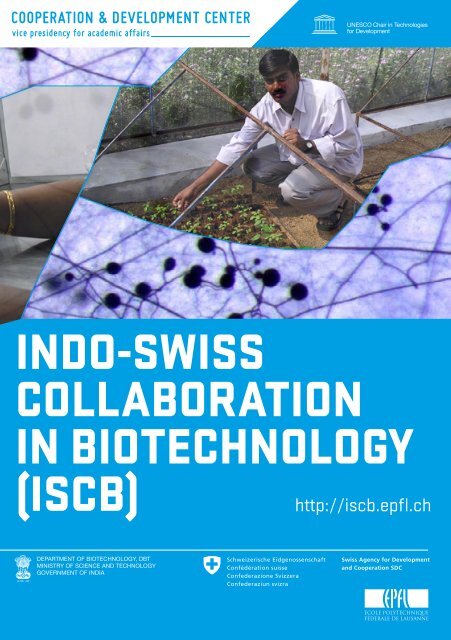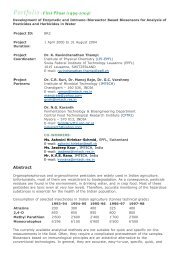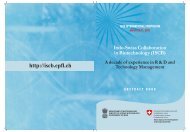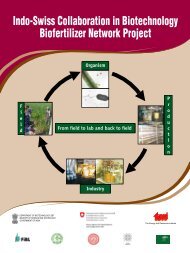indo-swiss collaboration in biotechnology - ISCB - EPFL
indo-swiss collaboration in biotechnology - ISCB - EPFL
indo-swiss collaboration in biotechnology - ISCB - EPFL
You also want an ePaper? Increase the reach of your titles
YUMPU automatically turns print PDFs into web optimized ePapers that Google loves.
INDO-SWISS<br />
COLLABORATION<br />
IN BIOTECHNOLOGY<br />
(<strong>ISCB</strong>) http://iscb.epfl.ch<br />
DEPARTMENT OF BIOTECHNOLOGY, DBT<br />
MINISTRY OF SCIENCE AND TECHNOLOGY<br />
GOVERNMENT OF INDIA<br />
Schweizerische Eidgenossenschaft<br />
Confédération suisse<br />
Confederazione Svizzera<br />
Confederaziun svizra<br />
Swiss Agency for Development<br />
and Cooperation SDC
2 Indo-Swiss Collaboration <strong>in</strong> Biotechnology (<strong>ISCB</strong>)<br />
Background ∏<br />
The Indo-Swiss Collaboration <strong>in</strong> Biotechnology<br />
(<strong>ISCB</strong>) is a well established bilateral research and<br />
development programme, jo<strong>in</strong>tly funded and<br />
steered by SDC (Swiss Agency for Development<br />
and Cooperation, Federal Department of Foreign<br />
Affairs, Government of Switzerland) and DBT<br />
(Department of Biotechnology, M<strong>in</strong>istry of<br />
Science and Technology, Government of India).<br />
The <strong>ISCB</strong> programme was <strong>in</strong>itiated <strong>in</strong> 1974.<br />
In the first 25 years of the programme, a wide<br />
range of projects <strong>in</strong> <strong>biotechnology</strong> (e.g. human<br />
health or microbial processes) were supported.<br />
After an external evaluation <strong>in</strong> 1999, the ‘new<br />
<strong>ISCB</strong> programme’ was commissioned.<br />
Focus ∏<br />
This new <strong>ISCB</strong> programme focuses on <strong>in</strong>novative<br />
(bio)technologies <strong>in</strong> agriculture and environment<br />
with an impact on poverty reduction, food<br />
security and adaptation to climate change. <strong>ISCB</strong><br />
is support<strong>in</strong>g several jo<strong>in</strong>t research and<br />
development projects to improve pulse, wheat<br />
and cassava varieties as well as <strong>in</strong> the areas<br />
of biofertilizer, biopesticide, biosensor and<br />
bioremediation. These areas are central for<br />
the overall development of the rural and urban<br />
population <strong>in</strong> India.<br />
Mandate ∏<br />
• Develop climate resilient products and<br />
processes which have an impact on poverty<br />
reduction and food security. The key strategy,<br />
the value-cha<strong>in</strong> concept, has been followed<br />
to move research activities to product<br />
development.<br />
• Build capacities of Indian <strong>in</strong>stitutes and to<br />
promote R&D partnerships between Swiss<br />
and Indian <strong>in</strong>stitutes and private companies<br />
with strong economic, social, and ecological<br />
relevance.<br />
Current phase ∏<br />
The new <strong>ISCB</strong> programme is <strong>in</strong> its third phase<br />
(2007–2012). For this phase, about 4 million Swiss<br />
Francs and 4.8 million Swiss Francs have been<br />
provided from DBT and SDC, respectively. The<br />
programme <strong>in</strong>cludes about sixty scientific staff<br />
from about twenty Swiss and Indian research<br />
<strong>in</strong>stitutes. The focus of the third programme<br />
phase is particularly to steer projects towards<br />
product development. In addition, South-North-<br />
South <strong>collaboration</strong> became a new focus.<br />
GOVERNMENT OF INDIA<br />
Dept. of Biotechnology<br />
(DBT)<br />
<strong>ISCB</strong> INTRODUCTION <strong>ISCB</strong> ORGANISATION<br />
Technology Advancement Unit (TAU):<br />
New Delhi<br />
Jo<strong>in</strong>t Apex Commitee (JAC)<br />
Members: academia, <strong>in</strong>dustry, NGO’s<br />
Chair: DBT/SDC<br />
<strong>ISCB</strong> programme is implemented based on an<br />
agreement between SDC and DBT and the costs<br />
of the programme are shared between these<br />
two agencies.<br />
<strong>ISCB</strong>’s govern<strong>in</strong>g body, the Jo<strong>in</strong>t Apex Committee<br />
(JAC), def<strong>in</strong>es the strategic orientation of<br />
<strong>ISCB</strong>, approves projects, and steers programme<br />
activities.<br />
The Programme Management Unit (PMU) is<br />
located at the EPF Lausanne, where it is attached<br />
to the Cooperation & Development Center unit.<br />
The PMU is responsible for efficient and effective<br />
coord<strong>in</strong>ation and implementation of the <strong>in</strong>dividual<br />
projects, the management of f<strong>in</strong>ancial and other<br />
resources and highlights present and future<br />
needs of the programme.<br />
International scientific experts review project<br />
proposals and act as advisors.<br />
The <strong>ISCB</strong> programme supports jo<strong>in</strong>t projects<br />
with at least one Swiss — and one Indian project<br />
partner to create synergies across <strong>in</strong>stitutes<br />
and national borders. Agreements among the<br />
project partners and the programme management<br />
unit regulate rights, responsibilities and<br />
accountabilities of the project partners such as<br />
scientific objectives, funds (sanctioned by DBT<br />
and SDC) or <strong>in</strong>tellectual property.<br />
GOVERNMENT OF SWITZERLAND<br />
Swiss Agency for Development<br />
& Cooperation (SDC)<br />
International Review<br />
and Advisory Pool<br />
Programme Management Unit (PMU):<br />
Ecole Polytechnique Fédérale de Lausanne<br />
Project Partners INDIA Project Partners SWITZERLAND<br />
Agreements Cooperation Fund flow<br />
In 2010, the Technology Advancement Unit (TAU)<br />
was set up <strong>in</strong> India. Transfer of knowledge from<br />
‘research to application’ <strong>in</strong> the specific sectors of<br />
agriculture and environment is a challeng<strong>in</strong>g<br />
task. The overall objective of the TAU is to create<br />
a conducive environment for technology transfer<br />
and product development as well as to concretely<br />
support the <strong>in</strong>dividual project partners on<br />
their way towards product development. As a first<br />
step, the TAU will focus on support<strong>in</strong>g projects<br />
of the <strong>ISCB</strong> exclusively. Over the medium and<br />
long term, the TAU is envisaged to be nurtured<br />
as an autonomous organisation by the DBT<br />
<strong>in</strong> order to provide broader services beyond<br />
the <strong>ISCB</strong> projects.
4 Indo-Swiss Collaboration <strong>in</strong> Biotechnology (<strong>ISCB</strong>)<br />
PROJECT INFORMATION<br />
PULSE<br />
CONTROL OF STRESS FACTORS<br />
IN CHICKPEA AND CASSAVA<br />
Objective ∏<br />
Improve the resistance of chickpea and cassava to<br />
biotic (<strong>in</strong>sects, virus) and abiotic (drought) factors<br />
by genetic transformation of the target plants.<br />
In the current phase the focus of two projects<br />
(BI, AAU) is to steer projects towards product<br />
development. Licens<strong>in</strong>g agreements were signed<br />
with private and public partners. Cooperation with<br />
and transfer of technology to private and public<br />
partners is enabled <strong>in</strong> parallel, which allows efficient<br />
product development towards the end-user.<br />
Projects ∏<br />
- UB and MKU: Genetic diversity and RNAi-based<br />
control of cassava mosaic gem<strong>in</strong>ivirus <strong>in</strong> India<br />
- BI: Evaluation of ASAL express<strong>in</strong>g chickpea<br />
transgenic plants for the <strong>in</strong>heritance of aphid<br />
resistance<br />
- UAS: Introgression breed<strong>in</strong>g for the develop- develop-<br />
ment of genetically modified chickpeas (Cicer<br />
ariet<strong>in</strong>um L.) for protection aga<strong>in</strong>st pod borer<br />
(Helicoverpa armigera) and aphid (Aphis<br />
craccivora)<br />
- AAU (ICRISAT-K, ICRISAT H): Genetic transformation<br />
of chickpeas (Cicer ariet<strong>in</strong>um L.) us<strong>in</strong>g<br />
a chimeric Bt-Cry2Aa gene to confer protection<br />
aga<strong>in</strong>st pod borer (Helicoverpa armigera)<br />
- ICRISAT-K: Characterization and evaluation of<br />
transgenic events of chickpea conta<strong>in</strong><strong>in</strong>g the<br />
DREB1A transcription factor for tolerance to<br />
drought stress under conta<strong>in</strong>ed greenhouse<br />
and field conditions<br />
Project Partners ∏<br />
• Prof T Hohn (Coord<strong>in</strong>ator), University of Basel<br />
(UB), Institute of Botany, Basel, Switzerland<br />
• Prof S Das, Bose Institute (BI), Plant Molecular<br />
and Cellular Genetics, Kolkata, India<br />
• Prof PU Krishnaraj, University of Agricultural<br />
Sciences (UAS), Institute of Agricultural<br />
Biotechnology, Dharwad, India<br />
• Prof BK Sarmah, Assam Agricultural University<br />
(AAU), Department of Agricultural<br />
Biotechnology, Jorhat, India<br />
• Dr KK Sharma, International Crops Research<br />
Institute for the Semi-Arid Tropics (ICRISAT-K),<br />
Genetic Transformation Laboratory,<br />
Patancheru, India<br />
• Dr HC Sharma, International Crops Research<br />
Institute for the Semi-Arid Tropics (ICRISAT-H),<br />
Genetic Transformation Laboratory,<br />
Patancheru, India<br />
• Prof K Veluthambi, Madurai Kamaraj University<br />
(MKU), School of Biotechnology, Madurai, India
6 Indo-Swiss Collaboration <strong>in</strong> Biotechnology (<strong>ISCB</strong>)<br />
WHEAT<br />
IMPROVEMENT OF WHEAT RESISTANCE<br />
Objective ∏<br />
Contribute to the development of new varieties <strong>in</strong><br />
wheat with improved endogenous fungal disease<br />
resistance and heat tolerance by marker assisted<br />
breed<strong>in</strong>g.<br />
This enables the design and implementation of<br />
adapted markers assisted breed<strong>in</strong>g strategies <strong>in</strong><br />
Indian wheat breed<strong>in</strong>g programmes <strong>in</strong> order to<br />
mitigate the effects of climate change.<br />
Projects ∏<br />
- UZ: Genomics for improvement of fungal<br />
disease resistance <strong>in</strong> wheat<br />
- DU: Functional genomics of thermal tolerance<br />
<strong>in</strong> wheat<br />
- PAU: Genomics for improvement of fungal<br />
disease resistance and term<strong>in</strong>al heat tolerance<br />
<strong>in</strong> wheat<br />
- DWR: Molecular characterization and genetic<br />
enhancement of fungal disease resistance and<br />
term<strong>in</strong>al heat tolerance <strong>in</strong> wheat<br />
Project Partners ∏<br />
• Prof B Keller (Coord<strong>in</strong>ator), University of Zurich<br />
(UZ), Institute of Plant Biology, Zurich,<br />
Switzerland<br />
• Prof P Khurana, University of Delhi South<br />
Campus (DU), Department of Plant Molecular<br />
Biology, New Delhi, India<br />
• Prof K S<strong>in</strong>gh, Punjab Agricultural University<br />
(PAU), Department of Plant Breed<strong>in</strong>g, Genetics<br />
and Biotechnology, Ludhiana, India<br />
• Prof R Tiwari, Directorate of Wheat Research<br />
(DWR), Karnal, India<br />
BIOFERTILIZER<br />
IMPROVEMENT OF SOIL QUALITY<br />
Objective ∏<br />
Improve the quality and yield of crops by mak<strong>in</strong>g<br />
use of the beneficial effects of plant-growth<br />
promot<strong>in</strong>g bacteria and mycorrhizal fungi<br />
(biofertilizer) on the nutrient and water uptake<br />
efficiency and stress tolerance of plants.<br />
In the current phase the focus is on development<br />
of mass production and formulation technologies<br />
and the transfer to private partners for commercialization.<br />
In 2012, the <strong>collaboration</strong> with private<br />
sector was <strong>in</strong>itiated.<br />
Projects ∏<br />
- TERI: Development of technology for <strong>in</strong> vitro<br />
mass production of selected arbuscular<br />
mycorrhizal fungis (AMF) and field validation<br />
and demonstration of f<strong>in</strong>ished product on<br />
wheat <strong>in</strong> India<br />
- FiBL: Short- and mid-term effects of biofertilizers<br />
on wheat yield and quality <strong>in</strong> different<br />
environments<br />
- UB-B: Application and transfer to India of<br />
molecular tools for monitor<strong>in</strong>g of Plant Growth<br />
Promot<strong>in</strong>g Rhizobacteria (PGPR) bio<strong>in</strong>oculants,<br />
particularly Pseudomonas spp., <strong>in</strong> wheat crops<br />
<strong>in</strong> tropical soils<br />
- IITD: Mass scale multiplication of PGPR &<br />
development of consortium formulations with<br />
suitable carriers<br />
- GBPUAT: Short- and mid-term effects of biofertilizers<br />
on wheat yield and quality <strong>in</strong> different<br />
environments<br />
- UB-W: Manag<strong>in</strong>g AMF for susta<strong>in</strong>able agriculture:<br />
Molecular tools for stra<strong>in</strong>-specific trac<strong>in</strong>g and<br />
quantification of AMF applied as bio-fertilizers.<br />
Project Partners ∏<br />
• Dr A Adholeya (Coord<strong>in</strong>ator India), The Energy<br />
and Resource Institute (TERI), New Delhi, India<br />
• Dr P Mäder (Coord<strong>in</strong>ator Swiss), Research<br />
Institute of Organic Agriculture (FiBL), Soil<br />
Sciences Division, Frick, Switzerland<br />
• Prof T Boller, University of Basel (UB-B),<br />
Institute of Botany, Basel, Switzerland<br />
• Prof V Bisaria, Indian Institute of Technology<br />
Delhi (IITD), Department of Biochemical<br />
Eng<strong>in</strong>eer<strong>in</strong>g and Biotechnology, New Delhi, India<br />
• Dr A Sharma, GB Pant University of Agriculture<br />
and Technology (GBPUAT), Department of<br />
Biological Sciences, Pantnagar, India<br />
• Prof A Wiemken, University of Basel (UB-W),<br />
Institute of Botany, Basel, Switzerland<br />
7
BIOREMEDIATION<br />
IN SITU DEGRADATION OF PESTICIDES<br />
Objective ∏<br />
Develop a bioremediation technology to treat<br />
pesticide contam<strong>in</strong>ated Indian soils by us<strong>in</strong>g<br />
specific <strong>in</strong>oculation of previously enriched<br />
pesticide degrad<strong>in</strong>g bacteria (bioaugmentation).<br />
The overall objective of the current project phase<br />
is to improve and ref<strong>in</strong>e the bioremediation<br />
technology for HCH (hexachlorocyclohexane)<br />
contam<strong>in</strong>ated soil <strong>in</strong> order to be able to offer siteadapted<br />
concepts depend<strong>in</strong>g on the k<strong>in</strong>d of soil<br />
and the type of contam<strong>in</strong>ation.<br />
Jo<strong>in</strong>t project ∏<br />
- Environmental risk and bioremediation of<br />
hexachlorocyclohexane isomers<br />
Project Partners ∏<br />
• Prof Ch Holliger (Coord<strong>in</strong>ator), Swiss Federal<br />
Institute of Technology Lausanne (<strong>EPFL</strong>),<br />
Laboratory for Environmental Biotechnology,<br />
Lausanne, Switzerland<br />
• Dr HP Kohler, Swiss Federal Institute of<br />
Aquatic Science and Technology (EAWAG),<br />
Environmental Microbiology, Dübendorf,<br />
Switzerland<br />
• Prof R Lal, University of Delhi (UD),<br />
Department of Zoology, Delhi, India<br />
• Dr T Poiger, Agroscope Chang<strong>in</strong>s Wädenswil<br />
Research Station (ACW), Environmental<br />
Protection and Consumer Safety, Wädenswil,<br />
Switzerland<br />
• Dr V Ra<strong>in</strong>a, Kal<strong>in</strong>ga Institute of Industrial<br />
Technology (KIIT), School of Biotechnology,<br />
Bhubaneswar, India<br />
BIOSENSOR<br />
DETECTION OF PESTICIDES<br />
Objective ∏<br />
Develop a set of immunobioreactor based<br />
disposable biosensor devices/kits for the rapid<br />
detection of selected pesticides with a high<br />
degree of sensitivity, rapidity and potential for<br />
wide field application.<br />
The specific objective of the current phase is to<br />
establish a private-public-partnership to make a<br />
decisive step towards a valuable product for the<br />
farmers and other applicants.<br />
Project ∏<br />
- Simultaneous optical detection of multiple<br />
pesticides from water sample on a microfluidic<br />
platform<br />
Indo-Swiss Collaboration <strong>in</strong> Biotechnology (<strong>ISCB</strong>)<br />
Project Partners SBIRI ∏<br />
• Dr CR Suri, Institute of Microbial Technology<br />
(IMTECH), Chandigarh, India (public partner)<br />
• Dr MS Thakur, Central Food Technological<br />
Research Institute (CFTRI), Mysore, India<br />
(public partner)<br />
• Bigtec, Bangalore, India (private partner)<br />
9
BIOPESTICIDE<br />
BIOCONTROL OF POD BORER<br />
Objective ∏<br />
Develop and test efficient and cost-effective<br />
biological methods to control the pod borer<br />
(Helicoverpa armigera) <strong>in</strong> pulses based on the<br />
<strong>in</strong>troduction of specific entomopathogenic fungi,<br />
which are natural enemies of the pest <strong>in</strong>sects.<br />
In the current programme phase, the project is<br />
supported to establish the conditions to be<br />
f<strong>in</strong>anced <strong>in</strong> the frame of SBIRI. The Small Bus<strong>in</strong>ess<br />
Innovation Research Initiative (SBIRI) is a fund<strong>in</strong>g<br />
scheme <strong>in</strong>troduced by DBT created to boost<br />
public-private-partnership efforts <strong>in</strong> India.<br />
A SBIRI project was approved and launched<br />
<strong>in</strong> 2011. The project will be further monitored<br />
and supported by <strong>ISCB</strong>.<br />
Project ∏<br />
- Transferr<strong>in</strong>g myco<strong>in</strong>secticide technology<br />
to the private sector and launch<strong>in</strong>g a SBIRI<br />
project.<br />
Project Partners ∏<br />
• Dr MV Deshpande, Biochemical Sciences<br />
Division, National Chemical Laboratory (NCL),<br />
Pune, India (public partner)<br />
• HiTech Bioscience India Ltd. (HTBS), Pune,<br />
India (private partner)<br />
<strong>EPFL</strong><br />
http://www.epfl.ch<br />
With more than 350 laboratories and research<br />
groups and 13 complete study programs, <strong>EPFL</strong><br />
(Swiss Federal Institute of Technology Lausanne)<br />
is one of Europe’s most <strong>in</strong>novative and productive<br />
technology <strong>in</strong>stitutes. Its ma<strong>in</strong> campus br<strong>in</strong>gs<br />
together over 11,000 people – students, researchers<br />
and staff. The school’s structure facilitates<br />
transdiscipl<strong>in</strong>ary research and encourages<br />
partnerships with other <strong>in</strong>stitutions <strong>in</strong> both<br />
fundamental research and eng<strong>in</strong>eer<strong>in</strong>g<br />
applications.<br />
Indo-Swiss Collaboration <strong>in</strong> Biotechnology (<strong>ISCB</strong>)<br />
Cooperation & Development Center<br />
(CODEV)<br />
http://cooperation.epfl.ch<br />
cooperation@epfl.ch<br />
About us ∏<br />
Compris<strong>in</strong>g a team of 20 people, CODEV’s<br />
mission is to promote and coord<strong>in</strong>ate scientific<br />
cooperation activities with<strong>in</strong> <strong>EPFL</strong>.<br />
<strong>EPFL</strong> thereby aims to contribute to the most<br />
press<strong>in</strong>g world challenges by encourag<strong>in</strong>g<br />
scientific partnerships, research and education<br />
that will help adapt technological <strong>in</strong>novations<br />
to develop<strong>in</strong>g countries.<br />
Activities ∏<br />
• Research<br />
• Management of research programs<br />
• Education<br />
• Expertise & Advice<br />
• Communication & Events<br />
UNESCO Chair ∏<br />
In 2007, CODEV was recognized as a UNESCO<br />
Chair <strong>in</strong> Technologies for Development. The Chair<br />
organizes its activities around 4 priority areas:<br />
• Technologies for the susta<strong>in</strong>able development<br />
of habitat and cities<br />
• ICTs for the environment<br />
• Science and technology for disaster risk<br />
reduction<br />
• Technologies for susta<strong>in</strong>able energy production<br />
11
<strong>ISCB</strong><br />
<strong>EPFL</strong><br />
Station 10, CM 2 305<br />
1015 Lausanne<br />
SWITZERLAND<br />
iscb@epfl.ch<br />
+41 (0)21 693 19 91





